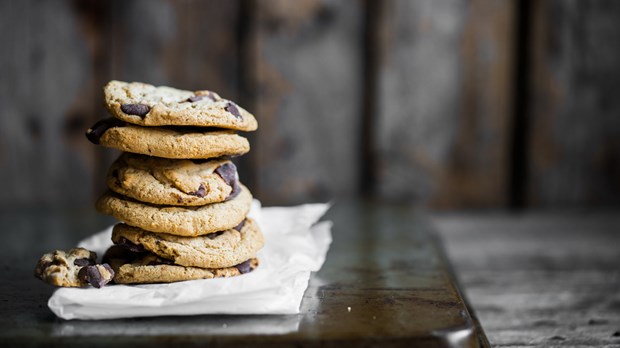I Was a Food Addict

The warm chocolate chip cookie melted in my mouth. Was that my sixth or my seventh one? Holding my stomach, queasy from too many sweets, I sat down at my kitchen table that cold January evening in 1990 and thought, I've got to stop eating so much.
Shame over my lack of control filled me, adding to my growing sense of failure. A client couple I'd counseled for months was getting a divorce, and as a beginning psychotherapist, I felt I'd failed them.
The truth is, I felt out of my league. I came from a working-class family, not a professional one. While I believed I was living God's dream for me, shaming statements I heard as a child came back to me: Aren't you getting too big for your britches? I felt inadequate whenever I read articles about counseling; was I doing therapy right?
Chocolate chip cookies took the edge off my feelings of inadequacy and fear. Sugar and fat: my friends. I often sought reassurance from my husband and my colleagues. But nothing calmed my anxiety like chocolate. And it was always available.
Sugar and Shame
But the self-punishing voices were always there too: When you're seeing your clients, you act like you have everything under control, but your eating is out of control. You're going to be a fat slob. You know better.
Just that morning I'd asked God for self-control—like every other morning for the past two years. But I still ate too much. Up to size 16—172 pounds on my 5'4" frame—I hadn't weighed this much since I was nine months pregnant with our daughter 15 years ago. I felt tired and embarrassed.
Sighing, I washed the cookie sheet and went to bed. I was drifting off when the thought popped into my mind: Maybe the answer to my prayer about losing weight is no. I've weighed 172 for several months. My anxiety about therapy won't subside overnight—and I know that's why I'm eating so much.
But I didn't want to weigh 172 pounds! When I'd started graduate school eight years earlier, I weighed 135. Why should clients listen to me now? My problems stuck out like my fat hips.
Over the next month, the thought stayed with me that God was saying no. But even the word overweight provoked my anger. In March of 1990, I went to my physician for a physical. As he recorded his notes for my chart with his back turned to me, I heard him say, "Patient is overweight."
That's it, I thought. I need a new doctor. I don't need to be reminded of my weaknesses. I never went back to him. I knew I was overreacting, but I liked my inner voice sticking up for me, even if I was being too sensitive.
Self-Talk Transformation
As a therapist, I knew my self-talk reflected the fact that deep down I really believed I was "too big for my britches." I felt inadequate. I was afraid of being found out. Cookies calmed that fear, but I ate too many. Then I felt ashamed and ate more.
It was the classic addiction cycle: feeling pain, using a substance to numb the pain, feeling shame about using the substance, and then using the substance to numb the pain from the shame. An endless cycle—unless the shame is broken and the original pain is healed.
I didn't want to label myself a food addict, yet I certainly used food to numb anxiety. When the thought that Jesus was saying no didn't leave, I began to face the facts: You're learning to perform a professional job for which you feel inadequate. Anyone who feels inadequate feels anxious. You're eating your anxiety. You can love your overweight self, just as you are, because Jesus does. Even if you're a food addict. I was learning a kinder voice—one that spoke truth with love.
My prayer changed: "Jesus, thank you for helping me maintain this weight. Thank you that I've stopped gaining. Please help me love my weak, anxious self."
I found a new physician who didn't use the word overweight. I tried to accept myself as a weak person. I noticed other beginning therapists felt anxious too. One evening in the Sears appliance department, I ran into another beginner. I said, "Sometimes it takes me all day just to prepare to see one client couple in the evening."
"I'm so glad to hear you say that," she said. "I thought it was just me." We'd found each other out—and it wasn't so bad after all.
My anxiety level persisted, but I learned to stop shaming myself for my eating. At my first physical with my new physician, he said my cholesterol level was "exemplary." He didn't say anything about my weight, and I was healthy otherwise. I told myself: So you're too big. You're a small fat person. But you're healthy.
By 1993, because I saw my clients improve, my competence anxiety subsided. My weight stayed at 172, but I continued my kind self-talk over the next several years: You're an interesting person hidden inside a matronly body. Then, in the fall of 2002, just to get some weight-bearing exercise, I established the daily habit of a brisk morning walk, and I lost a few pounds. But even though my anxiety and shame were gone, losing 35 more pounds would require drastic reductions in my sugar and fat intake—not worth it!
The Wake-up Call
In November of 2003, however, after a routine physical, I received a call from the nurse. "Your triglycerides are 239. They should be less than 150," she told me. "You're at risk for a heart attack."
"Heart attack?" I leaned forward in my chair, stunned.
After I hung up, I took a deep breath and went to my computer to research triglyceride reduction. This was the first time I'd had a triglyceride test done— different from a cholesterol test—but I knew of people with high triglycerides who had to change their diet drastically. I liked my diet. All those nice chocolate chip cookies.
I soon found Joanne Larsen's "Ask a Dietitian" website, and I didn't like what I read. Several phrases jumped out at me: "circulating blood fat," "heart disease risk," and "eliminate simple sugars." Sugar! My favorite cookie recipe used two cups of sugar, not to mention the butter and chocolate.
I leaned back in my chair and gazed out the window, hardly noticing the darkening sky that presaged an early snow. This is it, isn't it, I thought. But how do I live without sugar? Suddenly, I sat up in the chair as I thought: Sugar has to go or I might go. At 52, I wasn't ready to die.
Like an irritating neon sign, that "239 triglycerides" began to flash in my mind. Eating cookies, I saw a neon "239." Reaching for a hot fudge sundae, I saw "239." Soon, I couldn't even think about sugar, not even a piece of fruit, without "239" burning in my mind's eye.
The New Me
That insistent neon was God's motivation. To turn it off, I stopped eating so many simple carbohydrates. I used the Dietitian.com information to develop a weight-loss plan to lose two pounds a week. I reduced my daily limit of sugar from 80 to 20 grams. No cookies (12 grams of sugar each), no Pillsbury Grand cinnamon rolls (22 grams per serving), not even an apple (16 grams). I made a blank chart and wrote down everything I ate. I substituted a low-sugar fruit spread on whole wheat crackers for chocolate chip cookies. Not the same, but not bad. Aldi's artichoke-garlic fresh salsa became a new favorite. You can do this, girl. You aren't going to risk a heart attack.
Amazingly, within six months, my weight dropped from 172 to 127 and my triglycerides from 239 to 100. I felt like a different person in my new size-10 wardrobe.
Jesus' answer to my long-ago prayer was finally yes. In the nurse's sobering facts about my health, Jesus gave me the wake-up call I needed to stop overeating. But healing from anxiety and shame had to come first to prepare the way for my weight loss. Jesus gave me new self-talk: God's dreams are bigger than my family's, and he'll accomplish his purposes in me. But had he never helped me lose 45 pounds, I learned the most important lesson: Anxious and fat or calm and thin, I can love myself because Jesus loves me . . . just as I am.
Karen Rabbitt, M.S.W., is a writer and speaker who lives in Illinois. Visit her blog at KarenRabbitt.typepad.com.
Copyright © 2007 by the author or Christianity Today/Today's Christian Woman magazine.
Read more articles that highlight writing by Christian women at ChristianityToday.com/Women
 Read These Next
Read These Next

 Does Your Child Have a Food Allergy?Parenting kids with allergies and intolerances (with faith)
Does Your Child Have a Food Allergy?Parenting kids with allergies and intolerances (with faith)
 Dancing Through DarknessWhen I lost my sight, God gave us a new kind of vision for our marriage.
Dancing Through DarknessWhen I lost my sight, God gave us a new kind of vision for our marriage.









 Homepage
Homepage